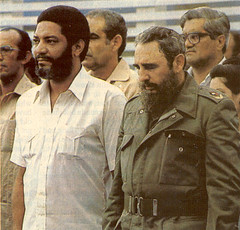
Former Grenada Prime Minister Maurice Bishop With President Fidel Castro in Cuba
Originally uploaded by panafnewswire
Grenada thanks Cuba for historical solidarity
Foreign Minister Peter Charles David received by Vice President Esteban Lazo in Havana
ESTEBAN Lazo Hernández, vice president of the Council of State and member of the Political Bureau of the Central Committee of the Communist Party of Cuba, received Grenadian Minister for Foreign Affairs and Tourism, Peter Charles David, who carried out an official visit to Cuba.
During the meeting, the two leaders expressed their satisfaction with the current state of bilateral relations and announced their support for increasing and strengthening links, particularly in the field of cooperation.
The Grenadian foreign minister expressed gratitude for Cuba’s historical solidarity with the Caribbean island and recalled the success of the recently-concluded Cuba-CARICOM Summit that took place in Santiago de Cuba last December.
Meanwhile, the Cuban vice president emphasized to the Grenadian foreign minister that his visit is an expression of the strengthening of the historic links of friendship between the two peoples and expressed the significance and potential of the current process of Caribbean integration.
Peter Charles David also met with Cuban Foreign Minister Felipe Pérez Roque where he used the opportunity to once again call for the U.S. blockade of Cuba to be lifted.
The Grenadian minister visited the Raudillo Fleitas International School of Nursing in Matanzas province where 19 young people from that country are currently studying.
“The relationship between Grenada and Cuba today is deeply-rooted within our people,” he stated.
Translated by Granma International
Havana. February 24, 2009
51 million jobs could disappear worldwide
The International Labour Organization (ILO) said that approximately 51 million jobs around the world could disappear by the end of the year. This means that 230 million people globally could be unemployed by 2010.
Unemployment brings with it an infinite number of social problems, principally a deterioration of the quality of life and the subsequent consequences. For example, when income is lowered many families face losing their homes.
Facing the rise of this uncontrollable disaster, the ILO proposes the creation of rescue plans for low-income families, many of whom will be obliged to live on less than one dollar a day.
Unemployment and necessity in homes forces many children to leave school to work and support their families, deteriorating, in certain ways, their future prostpects.
The phenomena experienced today, which has caused millions to fall into deep despair, is not only affecting poor or “third world” countries. According to the World Bank (WB), more people are falling into poverty in developing countries. In other words, the employment crisis is global and those who are feeling the worst of it are those who have always felt like the “masters of the world.”
In this respect, IMF director Dominique Strauss-Kahn, pointed out that the principal economies are in a deep depression and maintained that the worst is still to come.
One fact to keep in mind is that as the crisis becomes worse, many countries will start to close their doors to immigrants who, as usually occurs, are seeking to escape from the poverty in their own countries to work in others. (Taken from Rebelión)
Translated by Granma International
Havana. February 23, 2009
International economists conference on globalization
Three Nobel Prize winners and other well-known individuals to attend
Susana Lee
THE impact of and alternatives to the international economic crisis in all its dimensions from the approaches of various schools of thought will be the central themes of the 11th International Economists Conference on Globalization and Problems of Development, taking place in Havana from March 2 through 6.
Dr. Esther Aguilera, vice president of Cuba’s National Association of Economists and Accountants (ANEC), described the event as an exceptional opportunity to debate these crucial issues facing humanity today. More than 1,000 specialists in economic and social sciences from every continent are expected to attend.
Aguilera, who is also permanent secretary of the Latin American and Caribbean Economists Association (AEALC), announced that numerous individuals have already confirmed their participation, including Manuel Zelaya Rosales, president of the Republic of Honduras; Edmund Phelps (2007), Robert Mundell (1999) and Robert Engle (2003), winners of the Nobel Prize for Economic Sciences, and Monsignor Marcelo Sánchez Sorondo, chancellor of the Vatican’s Pontifical Academy of Sciences, who will all give master lectures.
Likewise, there will be representatives from 10 international and 10 regional organizations, such as the International Monetary Fund, the World Bank, the FAO, UNESCO, and other UN bodies, and also senators and deputies.
The idea for these conferences emerged in 1998 at the suggestion of Commander in Chief Fidel Castro during the Economy’98 international event.
The schedule will also include an AEALC general assembly and the International Conference of Economic Students.
Translated by Granma International
No comments:
Post a Comment